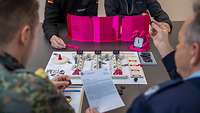Wargaming Initiative in Hamburg
- Date:
- Reading time:
- 2 MIN


Wargames are more than just games. In wargaming, you can evaluate scenarios, simulate environments, depict human behaviour and try new approaches. And, above all, you are allowed to make mistakes. Because if you cannot make mistakes in wargaming, then where can you?
200 years ago, an entirely new training method – the Prussian Kriegsspiel – was introduced in the Prussian Army. One of the key innovations of this method was its use of topographic maps. This year’s anniversary of the Kriegsspiel is one of the reasons why Germany was selected to host WIN 24.
Today, wargames are widely used both in academia and industry. As far as the military is concerned, modern wargaming has become an essential element of training. Even though WIN 24 is a specialised conference, it also wants to make a significant contribution to the further dissemination of the wargaming method.
The Prussian Kriegsspiel is regarded as the forerunner of modern wargames. More than 200 years ago, topographic models and playing pieces were used to train soldiers in gaining a better understanding of space and time as well as of the consequences of their decisions. But what does the Bundeswehr understand by wargaming today?
Wargaming is by no means a leisure activity. Actually, wargames are quite the contrary. They are mainly used for two different purposes: for enriching initial and follow-on training (known as ‘educational wargaming’) and for answering questions and thus contributing to decision-making (called ‘analytical wargaming’).
This makes wargaming a versatile and multifaceted method that can address everything from individual questions to broader (international) political issues. Also, wargames can be set in a variety of time periods ranging from historical times to the future. Moreover, wargames are not only limited to depicting military resources. They can involve any type of conflict over resources such as time, money, material or political capital.

One of the educational wargames to be presented at WIN 24 is HyDRA (short for ‘Hybrid Warfare Defence, Resilience & Awareness Game’)
Bundeswehr/Christian GelhausenWargames come in a variety of different formats. Depending on their objective, they take different forms ranging from small discussions with few rules and no ITInformation technology support to large-scale events with complex rules and many different ITInformation technology systems.
At the Bundeswehr Command and Staff College, the top-level military training institution of the German armed forces, educational wargaming is the focus of attention for conveying knowledge and promoting leadership and decision-making. Decisions made in a game will influence its further course, teaching players how to avoid predictable negative consequences or, failing that, how to deal with them – because losing a wargame will generally result in a steeper learning curve. Thus, failure – which usually has a negative connotation – can also be seen as an opportunity, promoting a culture that allows for mistakes.
There is one thing, however, that all types and variants of wargames have in common: wargaming can be seen as a tool. It helps players to make decisions, simulate their consequences and consider questions from different perspectives. So ... let’s play.